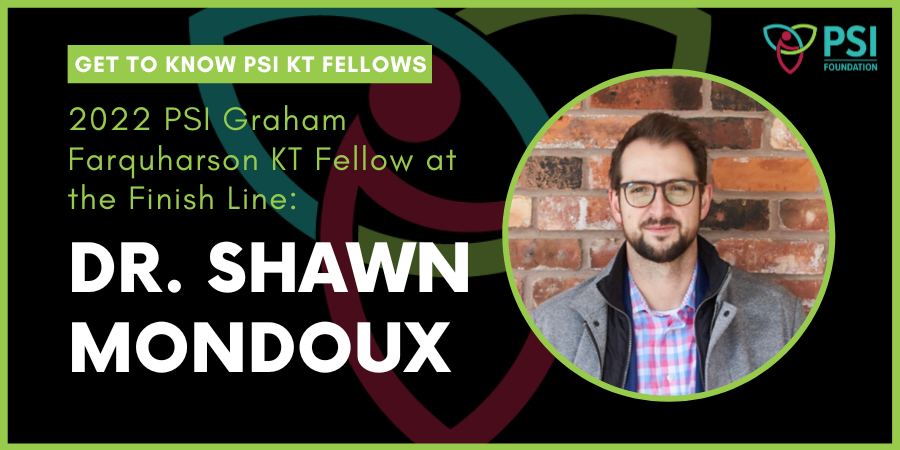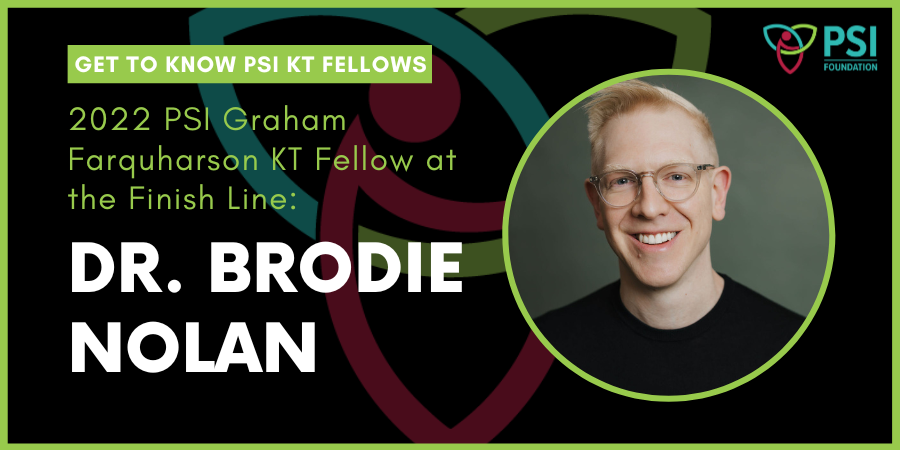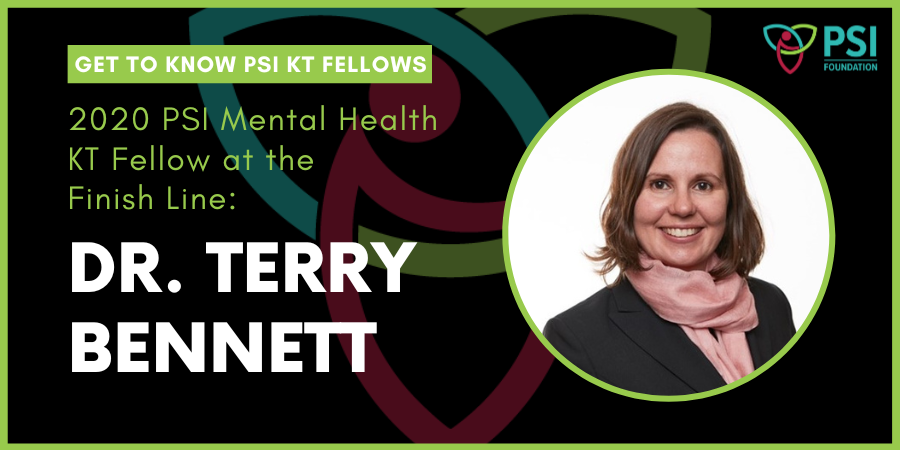After a few years of tirelessly working towards their research program and knowledge translation (KT) activities, our PSI KT Fellows reach the finish line of their fellowship. As they cross the end point towards their award, we asked our fellows for reflections on their journey to share their highlights from the fellowship and advice for other aspiring or current KT Fellows.
What are the key accomplishments and outcomes from your award?
The award enabled me to achieve transformative milestones in two core areas: academic research and healthcare innovation.
First, the fellowship provided the crucial infrastructure and support that allowed me to engage in high-level academic research in ways that had previously been inaccessible to me. With this support, I was able to generate new knowledge in the field of virtual care service delivery in Ontario — work that is now helping shape how virtual care will be designed and deployed in the Canadian healthcare system in the coming years. This contribution is particularly timely, as virtual care continues to evolve into a foundational element of our national care strategy.
Second, the award gave me the freedom to translate my academic work into real-world impact through entrepreneurship. I co-founded and led a healthcare technology startup rooted in my previous research, which operated for four years and built a strong professional and academic network across Canada and the United States. Along the way, we received multiple awards and were proud to complete the prestigious Rotman Creative Destruction Lab in 2024 — a capstone experience that brought further visibility and validation to the work we were doing.
Together, these accomplishments underscore the unique and essential role that this type of funding plays in catalyzing both academic discovery and innovation. This award didn’t just support my work — it unlocked it.
What are some lessons learned during the PSI KT Fellowship?
One of the most valuable lessons I learned during the fellowship is that while early plans are essential for setting direction, true impact often lies in the ability to adapt and respond to emerging opportunities. The preliminary goals we outlined at the outset were ambitious and well-intentioned — but as the work progressed, we found ourselves drawn toward newly opened pathways that were equally, if not more, important. These were areas of academic inquiry and influence that we hadn’t originally anticipated, but which proved deeply aligned with the fellowship’s broader aims of translating knowledge into meaningful change.
There’s a saying that “no plan survives first contact with reality,” and that was certainly true in our case. The key was not to abandon our ambition, but to remain nimble and pursue newly visible opportunities with equal intensity and purpose. This kind of pivot — toward unexpected but high-impact work — is only possible when scholars are given the time, space, and support to think creatively, follow the evidence, and engage deeply with new ideas.
What was the most memorable moment of this KT Fellowship?
The most memorable moments of the fellowship were deeply rooted in the remarkable teams I had the privilege of working with. On the academic side, I was fortunate to collaborate with talented individuals across a range of disciplines—locally and provincially—whose insights and dedication elevated the work in every way. Our partnerships with ICES, McMaster, and access to Ontario’s rich administrative datasets allowed us to conduct high-impact analyses that informed key areas of virtual care — a rapidly evolving space with real implications for patient access and system design.
But perhaps the most unforgettable experience came from the time I spent building and leading a private-sector team dedicated to translating research into real-world change. Thanks to the time and support this fellowship afforded me, I was able to pursue the commercialization of my academic work — an ambitious leap into the world of healthcare entrepreneurship. Over three years, we built a mission-driven company from the ground up, united by a shared vision to improve emergency medicine through data and innovation. Collaborating with a team of driven, creative, and like-minded individuals — each bringing unique expertise and perspective — was profoundly energizing and taught me as much about leadership, communication, and execution as it did about medicine or research.
These moments — whether at the research bench or in the startup boardroom — are enduring reminders of the power of collaboration, and of what can happen when visionary support like this fellowship meets an open and curious mind.
What are some general tips and advice you would give to those who are currently completing their KT Fellowship?
My advice is twofold.
First, lean deeply into the areas of research that align with your expertise and academic track record — these are often where your credibility, curiosity, and capability intersect most powerfully. But don’t stop there. Remain open to adjacent or emerging domains where your existing knowledge base can give you a unique advantage. Some of the most impactful and innovative work I pursued during my fellowship came from venturing just beyond the borders of my original focus — into spaces where opportunity met readiness.
Second, use this time not only to produce, but to reflect. These awards provide more than funding — they create rare intellectual space. Take this opportunity to ask big questions: about the status quo in your field, about the risks you’re willing to take, and about the kind of legacy you want your work to leave. While there are certainly productivity expectations, the true power of the fellowship lies in its capacity to let you challenge conventional thinking and pursue bold, ambitious ideas that might otherwise fall to the margins.
In short: capitalize fully on the freedom this fellowship affords. Think strategically, act ambitiously, and trust that this time — used well — can meaningfully elevate both your work and your future impact.



